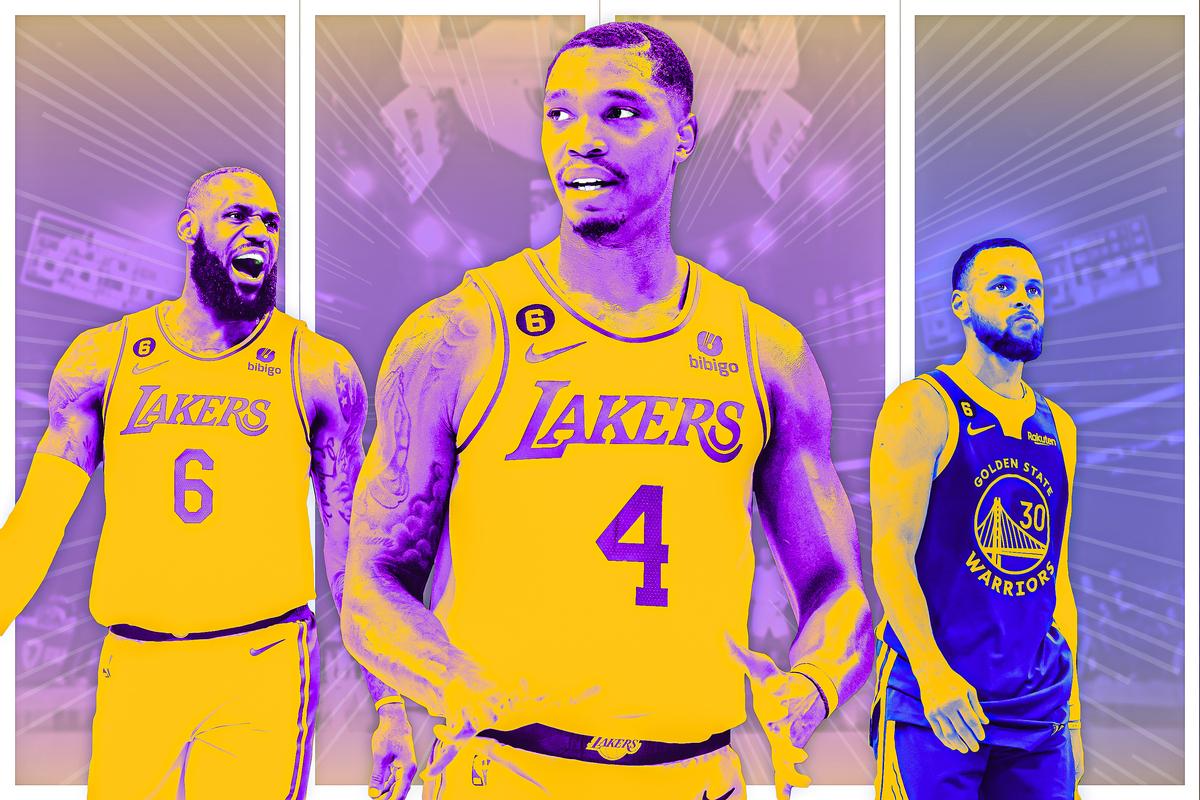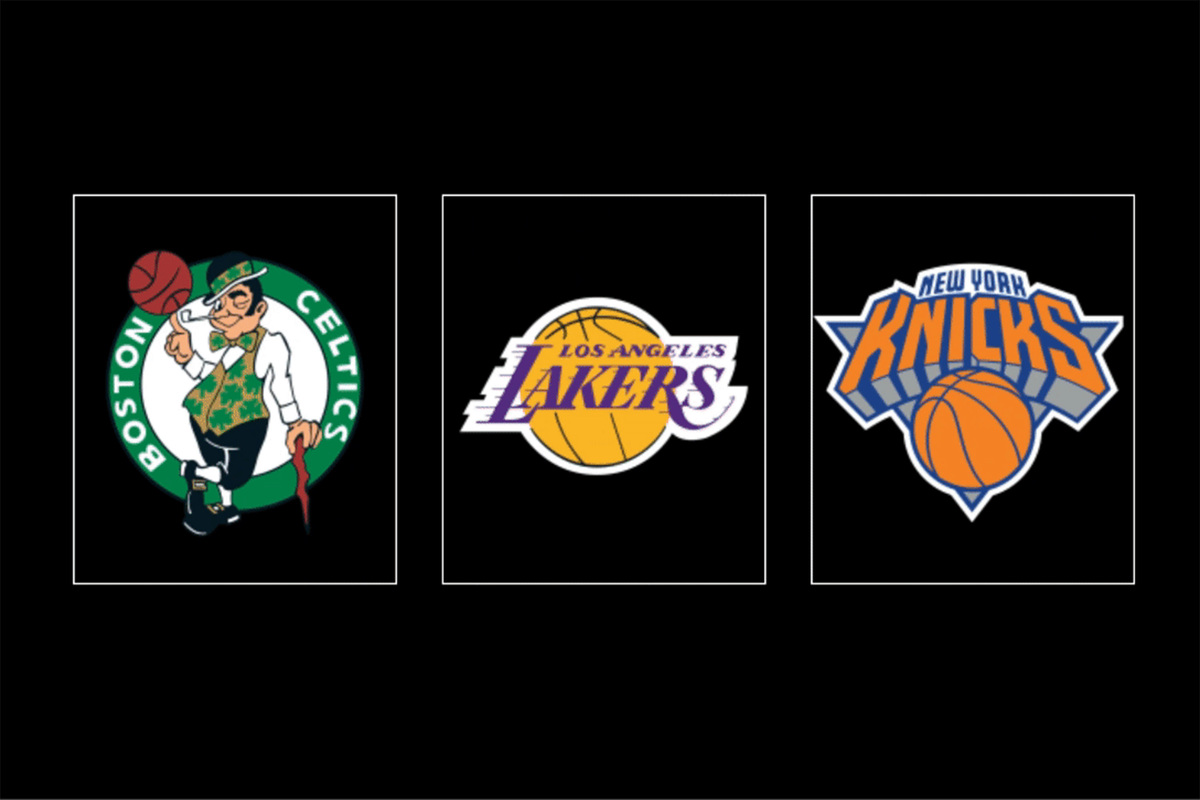Lonnie Walker IV Hijacked the Steph and LeBron Show
Inu003cstrongu003e u003c/strongu003eGame 4 of Lakers-Warriors, the series’ brightest stars took center stage, with Curry carving up the Lakers in the pick-and-roll and James hunting Curry, just like old times. That is, until an unlikely fourth-quarter hero emerged to push the Lakers’ series lead to 3-1.
The second-round series between the Los Angeles Lakers and Golden State Warriors features five future Hall of Famers on the court. It matches up two of the three most recent title winners. It pits perhaps the NBA’s two most recognizable stars against each other.
Yet in the series’ best game thus far, as every fourth-quarter possession practically dripped with tension, LeBron James didn’t take over to power his team to victory at Crypto.com Arena. Neither did teammate Anthony Davis, or Steph Curry in the road uniform.
Rather, a most unlikely hero emerged: Lonnie Walker IV, a castoff from the lowly San Antonio Spurs, who had barely played in the past two months, who didn’t score at all in the first three quarters of Game 4, and who nonetheless propelled the Lakers to a 104-101 victory and a 3-1 series lead with the most dramatic quarter of his career. The Lakers are now one win away from reaching the conference finals as a no. 7 seed; the defending champion Warriors are now one loss away from elimination.
And at least in Game 4, Walker was the chief reason.
That sentence is as improbable as Walker’s fourth quarter was. But here, watch the highlights to review: With hustle, confidence, and a silky-smooth jumper, Walker scored 15 points in the final frame and made as many field goals as the entire Warriors team. His midrange pull-up over Curry just after the two-minute warning served as the final lead change of the night.
“We don’t win this game without Lonnie Walker tonight, that’s for sure,” LeBron said in his postgame interview on TNT.
That’s quite a statement about a player who essentially disappeared from the Lakers rotation in the second half of the season. Although Walker began the 2022-23 campaign as a starter, he missed a month with left knee tendinitis and never rejoined the starting lineup even after returning from injury.
And as the Lakers refined their rotation after the trade deadline, Walker lost even more playing time. In the team’s final 16 regular-season games, he recorded nine DNPs and played 20-plus minutes just once (in a game that both LeBron and D’Angelo Russell missed). He didn’t get off the bench at all in the Lakers’ play-in victory against Minnesota. And he played only 15 minutes in the first round against Memphis—all to close out blowouts in garbage time.
That trend continued against Golden State. Walker didn’t play in Game 1 and emerged from the bench in Game 2 only because the Warriors led by 30 points entering the fourth quarter. But he did enough in that frame to earn consequential playing time in Game 3, and he parlayed that opportunity into even more minutes in Game 4.
Even those two performances, though—he combined for an efficient 21 points, on 8-for-14 shooting—didn’t remotely prepare anyone watching for Walker’s fourth-quarter, series-swinging outburst in Game 4. Walker had previously scored 15-plus points in a quarter just once in his NBA career, when he exploded for 19 in the fourth against the Rockets in December 2019. (That game is perhaps better remembered for the officials improperly overruling James Harden’s breakaway dunk.) The stakes were just a tad higher on Monday night.
Not that Walker himself noticed, evidently. “It just comes with a lot of confidence,” he said after the game about his final, game-winning bucket. “I made a couple of other shots prior to that, and I think my confidence was for sure at an all-time high. ... It’s probably a difficult shot for others, but it really isn’t a difficult shot for me.”
The Lonnie Walker Game—as it will forever be remembered in Lakers lore—was a whole bunch of fun for other reasons, too, as it was the first game to fulfill the hype that accompanied this meeting of championship teams. Game 1 entertained yet was truly competitive only in the final minutes. Games 2 and 3 were both blowouts, in either direction.
But in Game 4, the series’ brightest stars shined all together for the first time in the series. That started with Curry, who set out to show he’s not just the greatest shooter in NBA history, but one of the best point guards as well. Aside from his errant 3-point shot—he was just 3-for-14 from deep—Curry was just as masterful in this game as he was in his 50-point Game 7 against the Kings.
Mainly, Curry orchestrated the Warriors’ new game plan, which aimed to make Davis defend as many screens as possible, thereby drawing the Lakers’ best rim protector out to the perimeter and opening up the lane behind him.
That approach worked wonders. The Warriors targeted Davis with 24 picks in the first half and averaged a robust 1.13 points on those plays, per Second Spectrum. New starter Gary Payton II set 15 picks in the game—the highest single-game tally of his career. As a ball handler, Curry received 48 total screens—more than he had in any game during the Warriors’ title run last postseason.
Over one brilliant four-possession stretch in the second quarter, Curry displayed all the multitudinous ways he can torment a defense as he turned four consecutive picks with Davis’s man into four consecutive scores. He drove and dished to Donte DiVincenzo for a layup, sank a stepback 3 over Davis’s gargantuan arms, split a double-team and beat Davis to the hoop for an and-1 finish, and set up Kevon Looney for an uncontested layup.
Curry dished 14 assists in the contest—his highest total in a playoff game since 2014, before he won his first title—and carved up the Lakers defense in sometimes spectacular fashion.
Curry’s final line of 31 points, 14 assists, 10 rebounds, and three steals somehow undersells his impact on the game—if not for his triple-double, the Warriors would have been doomed in Game 4, as Curry received scant help from his teammates. Klay Thompson scored just nine points on 3-for-11 shooting. Andrew Wiggins missed a number of wide-open 3s. Jordan Poole (0-for-4 in 10 minutes) didn’t score at all, nor did he play in the fourth quarter.
Lakers coach Darvin Ham adjusted to the Warriors’ adjustment after halftime by putting Davis on Wiggins, and the Warriors curiously shifted away from their initial strategy rather than using Wiggins to set Curry’s screens. After facing 24 picks in the first half, Davis defended only seven in the second half—including a pair in the final 70 seconds as Curry desperately sought crunch time buckets.
The first of those screens, with Davis switching to play Curry one-on-one, led to a layup. But the second failed, as Davis, drawing on Kevin Love’s famous defensive stand in the waning seconds of the 2016 Finals, stuck with Curry and the Warriors star missed a stepback 2-point jumper and—following an offensive rebound—a stepback 3. On the next possession, a Draymond Green turnover clinched the victory for Los Angeles.
In the second half, the Lakers added a screen-setting wrinkle of their own, as LeBron—often a finisher in this series, but not a creator at his typical frequency—turned to hunting Curry just like old times. LeBron targeted Curry with 12 picks combined in the first three games of the series, then did so 12 times in the second half of Game 4 alone, per Second Spectrum. It looked like the 2015-18 Finals all over again.
The Lakers scored 1.33 points per chance when LeBron targeted Curry in the second half and perhaps also enjoyed the ancillary benefit of tiring out Curry, who was already shouldering an immense offensive burden. (When I wrote last year about previous times that playoff opponents hunted Curry in this manner, a source with one team that had done so told me that fatigue was a main reason to adopt the strategy.)
Thanks in part to this aggressive tactic, LeBron finished the game with 27 points to lead the Lakers. Davis added 23 points (19 of them in the first half, versus just four in the second—maybe he was tired from defending so many screens as well). Austin Reaves chipped in 21 points and was a particular help in steadying the home team during the third quarter, when the Warriors pulled ahead by 12 points and threatened to transform a close game into another blowout.
And, of course, Walker scored 15, all in the fourth quarter, as LeBron’s help bested Curry’s and the Lakers pulled ahead. This unexpected boost was reminiscent of Rui Hachimura’s contributions in Game 1 of the Lakers’ first-round upset of the Grizzlies, demonstrating the vitality of bench production for the West’s no. 7 seed.
This series isn’t over yet—LeBron and the Warriors know better than anyone just how safe a 3-1 lead is in the playoffs. Plus, the Warriors are back home for Game 5 and a potential Game 7, and they’ll have more adjustments to consider in a series that has featured new wrinkles every game. Will Payton start again, or perhaps Moses Moody, who played in crunch time in Game 4? Will Poole play at all, given his supreme struggles in the playoffs? Will Looney be healthy enough to play more minutes, and will the Warriors even want him to if he offers another non-shooter the Lakers defense can ignore?
The Lakers side is somewhat unsettled, too, even for a team with a 3-1 lead. Will LeBron continue to hunt Curry? Will Davis stay involved in the offense after a passive second half? What will happen to the starting rotation after Ham benched both Jarred Vanderbilt and Russell in crunch time? (Vanderbilt played only 11 minutes in Game 4, his fewest in any game this postseason; Russell’s 1-for-10 shooting made it much easier for Ham to turn to Walker down the stretch instead of his starting guard.)
But for now, L.A. can celebrate a crucial victory and its perch just a win away from the conference finals. With LeBron and Davis leading the way, the Lakers are perhaps unlikely underdogs—but they are underdogs nonetheless: With one more victory, they’d become the lowest-seeded conference finalist since the no. 8 Knicks in 1999. In that sense, Walker’s ultimate underdog comeback was a perfect fit for his team’s broader journey.


